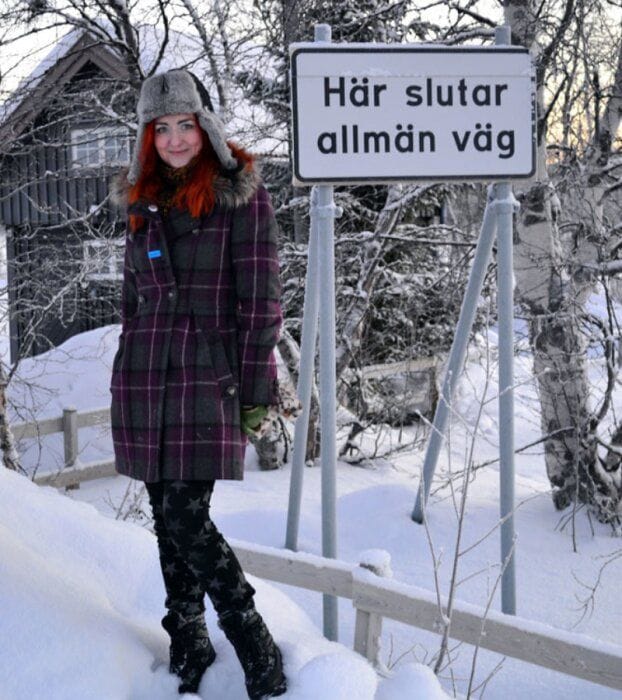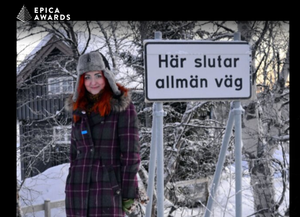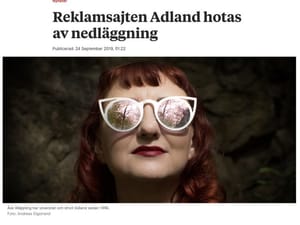I've been meaning to post this, but I kept getting bogged down with other things. A while back I was interviewed by the Epica Awards for their "behind the bylines" project. It's a series of interviews with all the members of the Epica Press Club, which also happen to be all of the people who are on the Epica Jury. You can find them all under "interviews", if you are curious about who judges your ads.
I've judged in the Epica awards for several years, so I thought it was fun to do a little interview, and it wasn't until Julie Descamps asked that I suddenly remembered that I took media classes as an elective course in junior high. This had completely slipped my mind. I've also worked as a news photographer's assistant covering the football riots in Stockholm 1992. I guess I was always interested in media.
The image that I chose to send her shows me posing at the sign my father was always so amused by, it reads "This ends the public road", and is in Jukkasjärvi, outside of Kiruna, Sweden. My mom was born in the parish that is past that end road, and he thought it was funny that she was from "the edge of civilization" as he jokingly put it. Every 8mm film he ever shot when visiting back home, contained the sign, and it has appeared many times in our old family photo albums. So naturally, I had to pose by it at some point, to carry that tradition on. Which brings me to the question of 'where I'm from' - I get that one a lot.
We know you have a very rich background - could you tell us a little bit about your place of origin?
This has always been a question that stops me in my tracks. I always find this one difficult to explain, as my entire family and I are from Lapland. The family birthplaces stretch from Sweden to Norway and Finland, for many hundreds of years, and I know all the places very well. I grew up hearing stories about family members who moved around within the Sápmi borders, while simultaneously moving around the world for jobs in a very "nomadic" manner. So I have lived in Saudi, the United States, Germany, and so on, and when I decided to go to University it was in New York and London. But when I get bogged down by modernity, as I did right after I graduated college in London, the only thing that brings me back to life is the land in Sápmi. We all belong somewhere, and we all will feel our blood slow down and heartbeat settle when we are "home", as I have.

I'll never be offended if people ask me where I'm from, and in the United States people never do as my accent is quite good, but since my accent is "generic American", I got asked this question a lot when I lived in the UK. The funniest was once, at a party, a bloke introduced himself and asked "where are you from" as soon as I had said hello. I knew it was the accent that triggered to question, so I said: "man, I don't bloody know. I moved around a lot." Normally after this reveal you might get the question "diplomat-brat or army-brat?" but this fellar just laughed out loud and said: "Oh, I know exactly what you mean", and then proceeded to list all the places he had grown up in, which included Sri Lanka, Malaysia, Vietnam, Indonesia, and a small quaint town in south England that I'd never heard of. We became instant friends over that exchange.
Regarding "the edge of civilization", it's a reference to the Finnish word Lappu, as in the Swedish word "Lappland" which in John Scheffer's "Laponia" written in 1674 was described like this:
Others fancy that the name of the Country is deriv’d from Lappu, which in the Finnonick language is furthermost, because it lies in the farthest part of Scandinavia.
Like my father, I'm just amused and slightly fascinated at the history of my family which covers three countries, but only in the east to west direction. That is, the 'farthest part of Scandinavia.' It is like the edge of civilization, because nature will overshadow everything there. The skies go on forever, the forest can be so thick, the mountains are beckoning you to climb them to see more views, and the vast vast land of white nothing that seemingly goes on forever in the winter.
The best part is the aurora, when I was a child I was told this was a reflection of how much fish was in the rivers and lakes. I still believe it.
Northern lights




